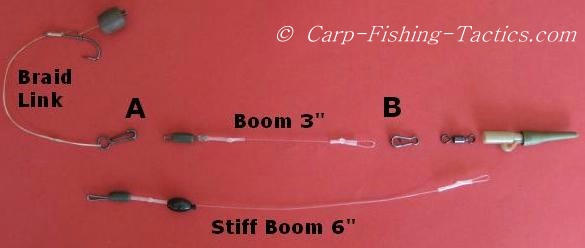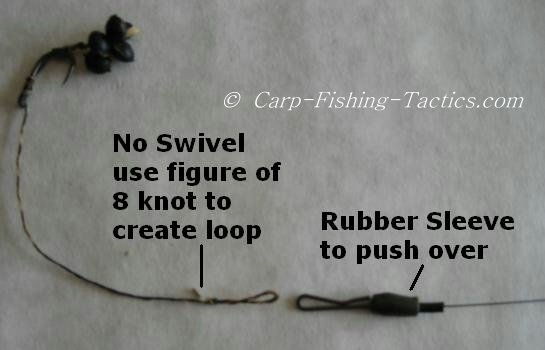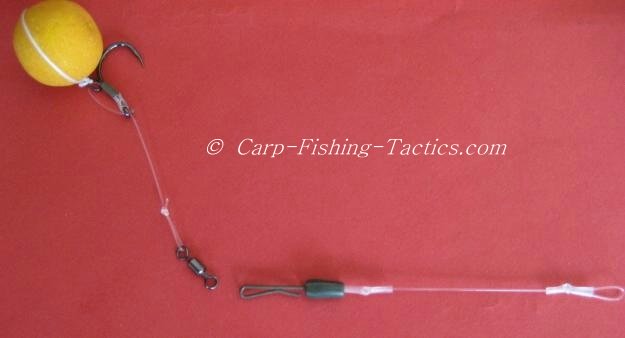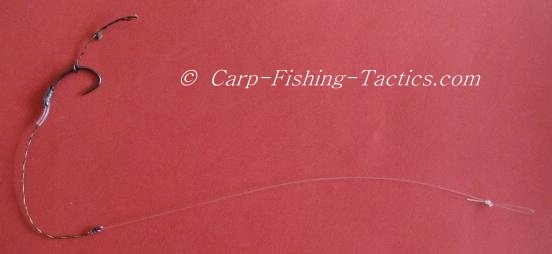Fast Change Combi Carp Rigs
Using a Changeable Combination Carp Rig
When I arrive at a new carp fishing lake I never know exactly what carp rig I'll need for the situation. I often use the marker rod to establish the topography of the bottom in order to determine which type of rigs may be best for a particular peg, but because I like to locate fish before choosing my peg a marker may scare off any fish in the area. For this reason, I like to get straight down and fish for any potential carp before using a marker rod. To help in this process I devised basic combi carp rigs made up of separate, removable components. This means that I can quickly change a certain part of the rig without having to create the whole rig completely. Doing this helps save me huge amounts of time. I can easily change certain parts quickly and try out different lengths or materials until I find a rig style that seems to work for a specific fishing situation. Shown below is a picture of the components of my interchangeable combi carp rig.
Changeable Carp Rig: Stiff Boom
Lets start with the middle section. Here I use a stiff boom made of Fox rigid mono line of 15 pounds. On the left end I have tied on a quick-change clip, and for the right end of the stiff boom I tied a loop using the figure of 8 knot. I then used shrink tube both ends over the knots to protect them and generally tidy up the rig. In the picture above it shows a 3 inch boom and under that there is a 6 inch boom so I can easily change the boom length if I feel a longer combi rig is necessary. The longer boom also has a removable weight attached at the left end, this is sometimes used to pin down the stiff part to the bottom if I'm fishing with a pop up bait.
I have about five of these booms already made up in my rig case, they are made up of varying lengths and different materials to suit the bottom of the lake bed. I also have some made from Amnesia black line for fishing on top of silt beds. At the right end of the stiff boom (marked B in picture above) I use a quick-change clip to link it to the loop end and then attach this clip to a standard swivel attached to the main line. In the picture above, the rig shows a plastic lead safety clip but this can be easily and quickly changed to a semi-fixed or free-running set up. Also, I often use a piece of tubing to cover the swivel and links at point B to help stop potential tangles on the cast. If the attachment links are left bear they tend to swing the hook link up towards the main line on casting and this can lead to tangles.
Changeable Carp Rig: Hook Link
For the hook link end (Point A in first picture) I often use some type of braided material. This allows the bait to easily extend into the mouth of the carp if it sucks at the bait. I can construct a new hook link for this rig very quickly by tying any braid to a new hook using a knotless knot. Then I determine what length I want to try out and quickly create a strong loop using a simple figure of eight knot. In the picture above at point A there is a swivel clip tied on the end of the braid, this was because I was using multi-strand material which is not very good with a figure of eight loop. I normally do not tie a swivel here because they tend to tangle easy on the cast. The picture below shows how I attach most of the braided hook links to the combi carp rig.
If tangles seem to be a problem I will use a small PVA bag for the hook link only. The quick-change link at point A in the first picture helps hold the PVA bag in place on the cast. This means the stiff boom can stay out of the bag and will pin down to the bed when the rig hits the bottom, although, I always pull the rig back slightly when I feel it hit the bottom, this help to straighten out the stiff boom so it doesn't end up looped up between the lead and bag.
Changeable Pop Up Carp Rig
The picture above shows a pop up hook link to attach to the boom, but must use a swivel with this set up so the whole pop up can twist 360 degrees!
Once I have found a certain length and/or materials that work well on the quick-change combi carp rig I will then construct the same style in the proper form of a combi rig. This eliminates potential tangles on casting and tidies up the rig more. Shown below is a combi rig I made up after testing with the quick-change rig set up.
The quick changing carp rig system can be used for many different combinations to test what style of carp rig works best. It is worth the effort in creating various forms of each component because they save so much time. It means you can have a variation ready or make new forms of rigs to try out without having to reel in a rod while you create it. They can also be used numerous times and even in combination with pop up carp rigs.
Fooling Bigger Carp with Trick Rig System
Fake Weed Carp Rig to Catch Wary Carp
Carp Fishing Hemp Rigs in PVA Bag Underwater!
A delicate complex Rig to Catch Out Wary Carp
Pellet Rigs using PVA Bag Tactics
Small Pellet Crap Fishing Rigs
Carp Fishing rigs showing various tactics to help fool carp into feeding
Which type of carp rig should be used; a fixed or running rig system
Can Big Carp smell & See Well?
The Effects of UK Weather on Carp Patrolling Movements
Carp Digestion & assimilation of Food Sources & Bait
Carp Spawning Do they still eat our baits?
Different Carp Bait for Catching Big Carp
Locate Big Carp from Visual Features in the Lake
Catch the Biggest Carp from the Margin Shallows




